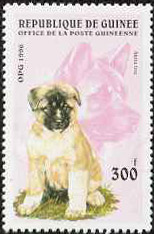
Cancer in dogs in Norway
Survey of canine cancers by Norwegian vets
source: K. Nordstoga et al
European Journal of Companion Animal Practice, vol VII(1) April 1997
starts p41, seven pages long
Initial results of a Norwegian study of cancer in dogs have become available. The project has been carried out by a number of bodies, including the Norwegian College of Veterinary Medicine. Dogs tend to suffer from different types of cancer from humans, and cancers tend to develop faster than in humans. Norway does not have a stray dog population, and most dogs are not neutered.
The total number of tumours recorded by the Canine Cancer Registry for 1990-1994 was 7,327, of which some 60% were malignant or potentially so. Mammary gland tumours accounted for 2,238 or 30.5% of total tumours, 2,220 affecting bitches and 16 affecting dogs, and 91% of mammary gland tumours were malignant. Epithelial skin tumours accounted for 990 tumours, 527 affecting bitches and 446 affecting dogs. There were 529 cases of cutaneous hystiocytoma affecting 218 bitches and 305 dogs. Malignant soft tissue tumours accounted for 452 cases, and mastocytoma for 449 cases. The dog's sex was not always recorded.
Boxers are the breed with the highest risk of developing tumours, followed by Flat-coated Retrievers, with these two breeds well above average. They are followed by English Cocker Spaniels, Giant Schnauzers, Rottweilers, Bernese Mountain Dogs, and English Setters, in descending order of risk. Dobermanns, Labrador Retrievers, German Pointers, Dachshunds, Golden Retrievers, Irish Setters, and Poodles also have higher than average risk, again in descending order, with Poodles close to the average for all breeds.
Dunkers have the lowest risk, followed by Elkhounds, Papillons, Finnish Hounds, Collies, Border Collies, Cavalier King Charles Spaniels, St Bernards, Tibetan Spaniels, Beagles, and Shetland Sheepdogs, in ascending order of risk. Bichon Frises, Pointers, Siberian Huskies, Newfoundlands, Gordon Setters and German Shepherds have lower than average risk, again in ascending order, with German Shepherds close to the average for all breeds.
Some breeds are more vulnerable to particular types of tumour, such as Bernese Mountain Dogs, more vulnerable to sarcomas, and Dachshunds, more vulnerable to mammary gland cancers, though their overall rates are not very different. Further research on breeds and tumours will be published in due course.
DO,CN


